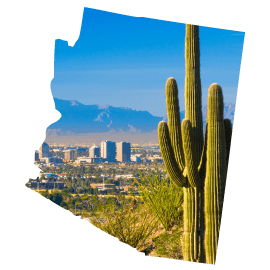Secondary Teacher Preparation: Arizona
Delivering Well Prepared Teachers Policy
Analysis of Arizona's policies
Arizona does not ensure that its secondary teachers are adequately prepared to teach grade-level content.
Although secondary teacher candidates whose primary assignments are in academic subjects are required to pass content tests, the state articulates that if an assessment is not offered in a particular subject, then an approved area will consist of a minimum of 24 semester hours of subject-related coursework. In addition, although Arizona offers a general science license, it fails to offer a content test in this area. Further, the state offers a general social studies license but does not require subject-matter testing for each subject area within this discipline (see Goals 1-G and 1-H).
Arizona also articulates that secondary candidates may satisfy the subject-knowledge requirement with a master's degree in the subject area, or a valid certificate from the National Board for Professional Teaching Standards.
Secondary teachers in Arizona may add approved areas to their licenses as outlined above.
Recommendations for Arizona
Require subject-matter testing for secondary teacher candidates.
As a condition of licensure, Arizona should require its secondary teacher candidates to pass a content test in each subject area they plan to teach to ensure that they possess adequate subject-matter knowledge and are prepared to teach grade-level content.
Require subject-matter testing when adding subject-area endorsements.
Arizona should require passing scores on subject-specific content tests, regardless of other coursework or degree requirements, for teachers who are licensed in core secondary subjects and wish to add another subject area, or endorsement, to their licenses. While a degree—even an advanced degree—may be generally indicative of background in a particular subject area, only a subject-matter test ensures that teachers know the specific content they will need to teach.
State response to our analysis
Arizona asserted that the approved area of general science only allows teachers to be appropriately certified to teach general science at the high school level. The state added that teachers must have the appropriate science content as an approved area to be appropriately certified. Arizona currently has AEPA exams for the following science content areas: biology, chemistry, earth science, middle grades general science and physics.
Last word
The issue of general science is addressed more fully in Goal 1-G. Arizona should ensure that its requirements do not make it possible for secondary teachers to be licensed to teach any core subjects with insufficient content knowledge.
Select another topic
Delivering Well Prepared Teachers
- Admission into Preparation Programs
- Elementary Teacher Preparation
- Elementary Teacher Preparation in Reading Instruction
- Elementary Teacher Preparation in Mathematics
- Middle School Teacher Preparation
- Secondary Teacher Preparation
- Secondary Teacher Preparation in Science
- Secondary Teacher Preparation in Social Studies
- Special Education Teacher Preparation
- Assessing Professional Knowledge
- Student Teaching
- Teacher Preparation Program Accountability
Expanding the Pool of Teachers
Identifying Effective Teachers
- State Data Systems
- Evaluation of Effectiveness
- Frequency of Evaluations
- Tenure
- Licensure Advancement
- Equitable Distribution
Retaining Effective Teachers
Exiting Ineffective Teachers
Research rationale
Research studies have demonstrated the positive impact of teacher content knowledge on student achievement. For example, see D. Goldhaber, "Everyone's Doing It, But What Does Teacher Testing Tell Us About Teacher Effectiveness?" Journal of Human Resources, vol. XLII no.4 (2007). See also Harris, D., and Sass, T., "Teacher Training, Teacher Quality and Student Achievement." Teacher Quality Research (2007).Evidence can also be found in White, Pressely, DeAngelis "Leveling up: Narrowing the teacher academic capital gap in Illinois" Illinois Education Research Council (2008); D. Goldhaber and D. Brewer, "Does teacher certification matter? High School Certification Status and Student Achievement." Educational Evaluation and Policy Analysis. 22: 129-145. (2000); and D. Goldhaber and D. Brewer, "Why Don't Schools and Teachers Seem to Matter? Assessing the impact of Unobservables on Educational Productivity." Journal of Human Resources (1998).

